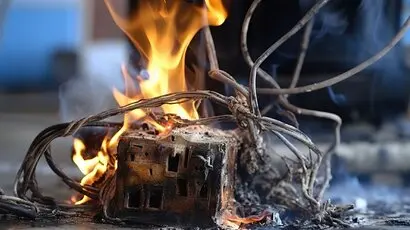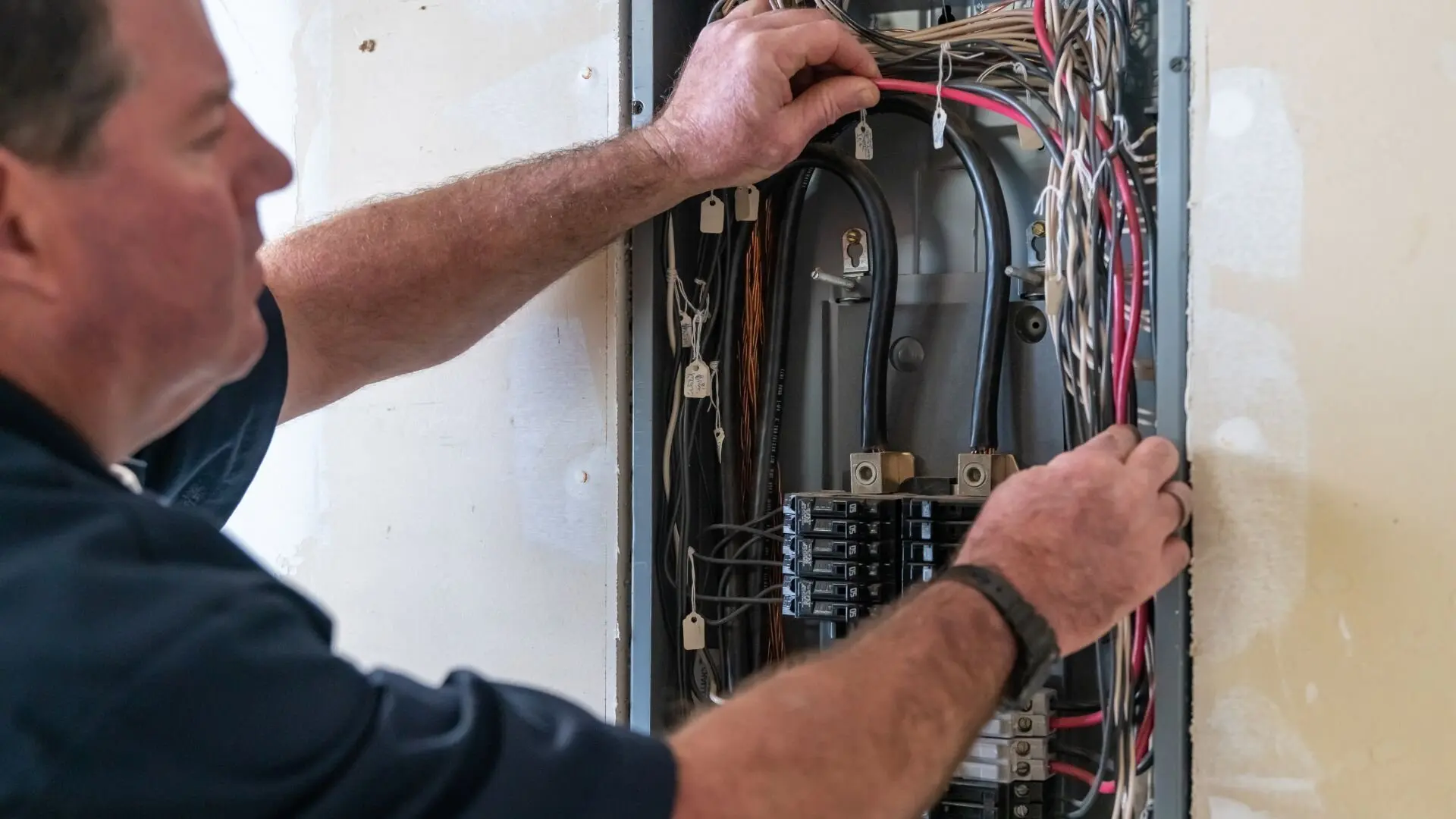
Get your free Melbourne Electrician quote today!
Our team of Melbourne Electricians is here to help you with any questions or concerns you may have. We’re committed to providing you with the best possible service and support.
Electrical surges can wreak havoc on your home electronics. Discover effective strategies to safeguard your valuable appliances and prevent costly repairs. Learn how to identify potential risks, install surge protectors, and create a safety plan.
[Power outages are frustrating](https://wpelectricians.com.au/blog/what-causes-power-outages), but electrical surges? They’re the real troublemakers. These sudden voltage spikes can fry your electronics, wreck appliances, and even spark dangerous fires—leading to expensive repairs and replacements.
Surges occur when there’s an unexpected spike in your home’s electrical current, often caused by lightning strikes, power grid issues, or dodgy wiring. Some surges can cause immediate havoc, while others can gradually wear down your devices, cutting their lifespan short before you notice a thing.
So, how can you safeguard your home? This guide covers what causes electrical surges and offers practical solutions ranging from basic surge protectors to full-on whole-house setups. Keep your home safe, your gadgets working seamlessly, and your wallet intact.
What Exactly Is an Electrical Surge ?
Think of an electrical surge like a rogue wave hitting your home’s power system. It’s a sudden spike in voltage that overwhelms your wiring, putting everything from your fridge to your laptop at risk.
What Causes Electrical Surges ?
Several factors can trigger an electrical surge, each affecting the stability of your home’s power system:
- Lightning Strikes
- A single bolt of lightning can send a sudden and extreme spike in electrical voltage through power lines.
- Even if the strike occurs kilometres away, the surge can travel through the grid and enter homes, damaging electronic devices and appliances.
- Homes without surge protection devices are at higher risk of experiencing severe power fluctuations.
- [Old or Faulty Wiring](https://wpelectricians.com.au/blog/common-house-wiring-issues)
- Outdated or damaged wiring can create an unstable electrical flow, increasing the chances of frequent surges.
- Worn-out insulation or loose connections can cause sudden spikes when the current flow is disrupted.
- Homes with older electrical systems are more prone to surges and should be inspected regularly.
- Large Electrical Appliances
- High-powered electrical appliances, such as refrigerators, air conditioners, and washing machines, draw significant energy when they turn on and off.
- These appliances cause small but repeated surges, gradually wearing down sensitive electronic devices over time.
- If not managed properly, these fluctuations can lead to power surge damage, reducing the lifespan of home electronics.
Signs of an Electrical Surge
Surges don’t always result in sparks or smoke, but there are clear warning signs that your system is experiencing voltage instability:
- [Flickering or Dimming Lights](https://wpelectricians.com.au/blog/why-are-my-lights-flickering)
- Sudden brightness changes in lights, even when no large appliances are in use, can indicate frequent surges.
- A drop in voltage from ongoing minor surges can cause bulbs to momentarily dim.
- [Tripping Circuit Breakers](https://wpelectricians.com.au/blog/circuit-breaker-tripping)
- Frequent circuit breaker trips may suggest that power surges are putting excess strain on the electrical system.
- If breakers trip repeatedly without an obvious cause, surge protection devices should be installed to stabilise voltage levels.
- [Damaged Electronic Devices](https://wpelectricians.com.au/blog/what-to-do-if-outlet-smells-like-burning)
- Electronic devices that stop working unexpectedly or show scorch marks on plugs or circuit boards may have been affected by a surge.
- A burning smell near outlets or damaged power cords can also be a sign of power surge damage.
Getting your head around power surges and catching these early signs can help you nip potential problems in the bud before they escalate.

Using Surge Protectors
[Surge protectors](https://wpelectricians.com.au/blog/do-surge-protector-prevent-electrocution) play a crucial role in defending against voltage spikes.
- Effectiveness: While they can’t stop all surges, they absorb excess voltage, protecting connected devices. Use high-quality surge protectors with sufficient joule ratings for your needs.
- Placement: Install them on sensitive electronics and high-value appliances to minimise damage.
Professional Assessment
If surges continue after these steps, seek professional help:
- Electrician Evaluation: [An electrician can](https://wpelectricians.com.au/blog/electrical-safety-inspection-preparation) thoroughly inspect and test for wiring issues, faulty circuits, or [inadequate grounding](https://wpelectricians.com.au/blog/what-is-electrical-grounding).
- Whole-House Solutions: Professionals can install whole-house surge protectors at the electrical panel for comprehensive protection.
Calling a professional ensures that deeper, potentially dangerous issues are addressed safely and effectively. Regular maintenance and proactive measures can significantly reduce the risk of damage from electrical surges.
How to Protect Your Home from Electrical Surges
A bit of prevention can make a big difference in safeguarding your home from surges. Here’s how you can do it:
Stay on Top of Electrical Maintenance
Regular check-ups can catch small issues before they turn into big problems. Keep an eye on:
- Worn-out Wiring – Frayed or damaged wires can increase the risk of surges. If you spot any, call an electrician.
- Circuit Breakers – If your breakers trip often, it’s a sign something’s off. Have a professional take a look.
A yearly check-up from a qualified sparky can save you from sudden and costly electrical surprises. It’s a small investment for peace of mind.
Upgrade Outdated Electrical Systems
If you live in an older home, [your wiring and electrical panel](https://wpelectricians.com.au/blog/electrical-wiring-upgrades-older-homes) might not be up to the task of handling today’s power-hungry appliances. Upgrading these systems can:
- Boost Capacity – Ensure your home’s electrical system can meet modern demands.
- Improve Safety – Reduce the risk of surges caused by old, overloaded circuits.
It’s a worthwhile investment that keeps your home running safely and efficiently.
Install a Whole-House Surge Protector
For ultimate protection, consider a whole-house surge protector. It:
- Shields Every Circuit – Installed at your main electrical panel, it stops surges before they reach your appliances.
- Extends Appliance Lifespan – Keeps your valuable electronics safe from unexpected voltage spikes.
A whole-house surge protector is like an insurance policy for your electrical system—it can save you thousands in the long run.
Stay Safe, Stay Powered
Protecting your home from electrical surges is essential for safeguarding your valuable appliances and electronics. Understanding the causes of surges, implementing preventive measures like surge protectors, and knowing what to do during and after a surge can significantly reduce the risk of damage.
It is crucial to assess your home’s electrical safety regularly. WP Electrical is here to assist you if you suspect any electrical issues or need professional electrical fault services. Our team of experts provides reliable and efficient solutions to keep your home safe and protected.
[Contact us today](https://wpelectricians.com.au/contact-us) for [comprehensive electrical fault detection](https://wpelectricians.com.au/services/fault-detection), inspection, and peace of mind. Published by: Pascal Harb17 October 2025